0 Volumes
No volumes are associated with this topic
Robert H.Bork Upsets A Century of Antitrust Law
According to the late Robert H. Bork, it ought to be fairly easy to identify price-fixing, because legitimate cases that harm the consumer by price manipulation aren't common, or may not even exist. With this, Bork convinced the judiciary to abandon a century of contrary belief while still a young law professor, thus establishing his own reputation with Ronald Reagan. He was appointed Solicitor General by Richard Nixon, unfortunately thus embroiling himself in Nixon's impeachment.
The young Yale law professor in his 1978 book, The Antitrust Paradox: A Policy at War with Itself pointed out that finding price-fixing , per se or otherwise, was pointless because protracted cases had become a smoke-screen, harming the predator more than the victim. According to Bork, the evolving regulatory climate made merger- by- regulatory- approval simpler for a modern monopolist, particularly for those with friends among the regulators who could skirt judicial restraint.
This reviewer was born two years before Bork was, and at the time regarded his early work as a product of a smart-aleck who happened to stumble onto an important insight. Now that Bork has been dead for years, and I have grown a bit older, too, I can see that men in high places were probably threatened by Bork's aggressiveness ( "Antitrust is a subcategory of ideology.") so that he spent most of his working life defending himself, leaving some of his legal revolution unfinished. Unfortunately, he had many intelligent insights swept aside by his conservative profession, as usual irked by a brash approach. Furthermore, along the way, the Judicial branch got lost defining what was wrong with monopoly. Chief Justice Earle Warren defined the size of the company (in the Brown Shoe v. U.S.opinion) as proof of damage to Competition, solidifying the opinion that damage to competition was the essential evil of monopoly. Prior to that, Judge Hand had focused attention on damage to small competitors, now also a discredited approach. Subsequent to Brown v. the US, rather futile excursions went into Horizontal v. Vertical mergers, and for some reason, railroad mergers were thought to be especially harmful to competition. Since the advent of Bork, however, harm or benefit to the consumer has been the definitive sign of a good or bad merger. It's a fairly simple change, but its growing influence swept away whole generations of litigation and opinion. Eventually, it is to be hoped that Bork's opinion that the essential evil is harm to the consumer-- will prevail, and harm to other competitors disregarded. The Law is slow to change, however, and as long as prior Judicial opinion is respected, adjustments of a century of antitrust will be worked around, slowly. The paradox is that this process will keep Bork's name alive and controversial for another century, during which time interest in his failed Supreme Court appointment will subside.
Nevertheless, he came to identify misbehavior of the antitrust Judiciary as at fault for interposing its personal judicial opinions for what more properly should have been simply returned to the legislative branch for revision. That is, by inventing the concept of "per se violation", the Judiciary wanted to be at the end of the line, essentially shutting the Legislative Branch out of the discussion and making it difficult to reopen the discussion. In some ways, this was a turf battle between government branches, and the robber barons took advantage of the distraction. In another sense, the central victim was the Constitutional Convention, for failing to recognize that a really serious problem cannot be swept under the rug, but must re-circulate until someone gets it right. The Supreme Court cannot be two things simultaneously; it cannot be both final and original.
* * * *
A similar case in point was the Supreme Court turning control of the medical profession over to the Insurance Industry in the Maricopa case. Luckily, there remains a loophole for re-opening this case on a technicality. It was only based on a 4-3 decision, on appeal of a motion for summary judgment, without examination of the evidence. Without trial of the evidence, that is, the Judiciary never even recognized that a per se violation was hiding the Judiciary's improper assumption of a legislative role for itself. Per se violations were apparently invented by Justice Brandeis' interpretation of the Clayton Antitrust Act, or at least some similarly ancient miscarriage.
Our brash legal youngster, therefore, accomplished the following:
1. He swept away a century of judicial invention, re-defining the evil of antitrust as harm to the consumer, not to competitors.
2. He left behind a mountain of muddled opinions, which are imagined to be final, but cannot be; it will be decades before the artifices of the law catch up with the change. Meanwhile, he decided and the Court is coming to agree, that courts should confine themselves to original intent, and stop judicial activism. That is, they should declare a Law unconstitutional and return it unchanged to Congress. 3. His Supreme Court appointment was unfortunately thwarted by Senator Arlen Specter, for unspecified reasons.
Yale Blue
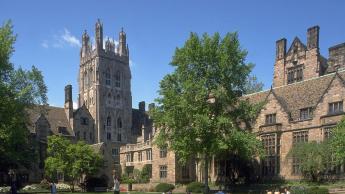
|
| Yale |
When a college applicant recently asked me what was so good about Yale, the question was so unexpected it took a moment to find a graceful answer. What finally occurred to me was the battle cry of New Orleans, before Hurricane Katrina. "It is impossible to find a bad meal in New Orleans." In culinary matters, New Orleans had a deep bench; with everybody in the city interested in good cooking, even the most dilapidated diner would serve you something rather good.
Well, in 1940 at least, it was impossible to take a course in Yale College that wasn't stimulating, taught by a distinguished professor who was charming and likable. At one point, I wandered into a course in early 19th Century English Literature, taught by William DeVane, a courtly and urbane gentleman who happened to be Dean of Yale College. Yale College refers to those who are seeking a B.A. degree; those taking a B.S. degree are said to be part of the Sheffield Scientific School; a few others were going to be engineers. In retrospect, I suppose Bill DeVane was just having fun teaching a course, possibly satisfying himself that Yale College was still working the way he wanted it to. In any event, I certainly didn't take that course because I cared who was Dean, or who DeVane was. I just thought it would be interesting to take a course in Jane Austen, Charles Dickens and some other early Victorian novelists. I'm glad I took that course, but I would have been just as glad if the topic had been the history of the Civil War, or a dozen other things. Except then I would have missed the experience of being close to DeVane, whom I now imagine was the architect of modern Yale College. The essence of this is that a Yale College student could select a course in any subject that caught his fancy and be confident it would be first-rate. Essentially invisible to me at the time was the absence of certain courses for the main reason there was no one outstanding who was available to teach that subject. If some topic was so central that a course just had to be taught, Shakespeare for example, I suspect the Dean or the President would have found money no obstacle to getting someone outstanding to teach it. Meanwhile, as long as you wandered around inside the printed course catalog, you would need no particular guidance. The faculty obviously enjoyed the students, quite often coming to lunch at student tables in the various residential colleges. For example, William Lyon "Billy" Phelps usually arrived early, and Branford students would fight to sit at his table. At least in those days, the students liked the faculty, and the faculty liked to be with the students.
That sounds like quite a contrast with what is rumored at other colleges today, although it's hard to be sure of comparisons across several decades. Perhaps it was the student rebellions of the sixties, long hair, a fashion of crude speech, and all the other features of the social revolution that started during the summer of love. Perhaps it was the demographic bulge with attendant overcrowding of campus and classroom. And perhaps it was never as idyllic as I remember; my classmate Bill Buckley certainly believed we were at the mercy of godless secularism marching in academic lockstep, although I don't remember anyone else agreeing with him. Today, so many people agree with Buckley's viewpoint that it's hard to assess. But there is little dispute that graduate students never taught undergraduate courses in my day, any lecture that I remember had more than fifty students in the class, no one would have been admitted to class without a tie and jacket, everyone addressed the faculty as "Sir". No one went to Europe in Junior Year, so there was no suspicion that extra tuition for decreased teaching was an administrative goal. Even if there had been a Junior Year Abroad, I wouldn't have taken it because there were so many neat courses in New Haven that seemed more attractive. There were no illicit drugs to worry about, and girls only arrived on the train for special occasions. Yes, there were some beer-drinking playboys, but it was plain to see they would soon flunk out.
The Supreme Court Gets Fed Up With Professors
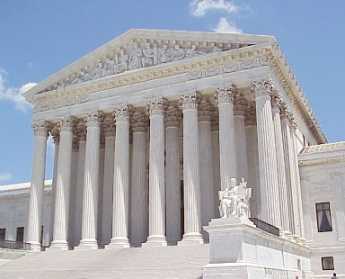
|
| Supreme Court |
In March 2006, years later, the Supreme Court, like a sleeping alligator, suddenly clamped its jaws on the whole Ivy League. Unanimously and without explanation, the Court told Universities they could not block the U.S. Armed Forces from recruiting on their campuses. A number of Ivy League Universities, in this case, the Yale Law School, had turned away Army recruiters because the Professors were offended by the Army's "don't ask, don't tell" policy on homosexual soldiers. The Supreme Court didn't even consider the reasons for the University's' policies, although private opinions of the Court conservatives could readily be imagined. The Court would not even dignify the matter with the thunderous phrases about first principles which otherwise might have seemed tempting. The Chief Justice signed the order, the Court unanimously agreed, and that's as final as you are going to get, for a show of power.
About a month earlier, things had seemed to be going the other way. The Harvard Faculty had forced out their president, Lawrence Summers because he violated their idea of politically correct speech. Quite significantly, two-thirds of the students took the side of Summers in the dispute, a warning that the faculty was getting itself into an isolated position. And if you look back, the nation had divided when it twice elected the younger George Bush, support for East Coast urban elitism was likely coming to the end of a fifty-year dominance of American life. Not to put too fine a point on it, the country was getting tired of the bitter-end Vietnam War protesters, now entrenched in academic strongholds like Robert the Bruce. It may well be that the country was irked by expensive gasoline, French disloyalty, and Middle East intransigence, while the Legal profession was having a private quarrel. Clever of the Chief Justice to allow people to think what they pleased. The Constitution directs the Armed Forces to defend us; interfering with recruitment is at best impertinent, at worst imperils the nation.
The Supreme Courts of the various states and the U.S. Supreme Court within the federal court system retain the power of administration of all the courts which report to them, but they rarely exercise that power actively. As the number of judges has increased significantly in the past thirty years, public oversight of the selection or election of judges has been stretched to the vanishing point. The result has been a strengthening of political control over the courts, a lessening of the quality of the judges themselves, and a growth of the influence of law schools. The same parade of professors keep appearing as friends of the court, the metropolitan newspapers can always count on them for Op-Ed pieces on difficult topics. Their opinions begin to surface as their graduates start to enter law practice. Slowly and relentlessly, the viewpoints of faculty members of the five prestige law schools have come to challenge, and sometimes to up-end, the rigidly organized opinions, right or wrong, of judge-made law. When it reaches the point where law schools can blithely block the ability of the armed forces to defend the country from foreign attack, it is past time to do something about it.
Some things never change. But this is going to change, and soon.
William Penn, Justice Holmes, and the Inner Light
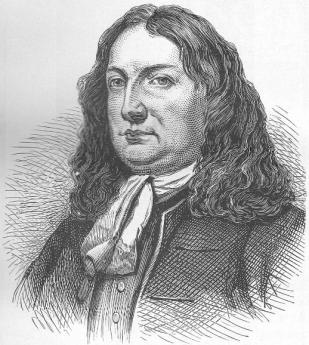
|
| William Penn |
WILLIAM Penn and Oliver Wendell Holmes, both lawyers, can be imagined debating fiercely across two centuries, about The Inner Light. Holmes famously stated his position at the opening of his book The Common Law : "The life of the law has not been logic, it has been experience." Penn, on the other hand, urged his Quaker followers to strip away centuries of books, teaching, and traditions, viewing in quiet contemplation their individual Light Within. Since the other central Quaker belief is that "there is that of God in every man", the implication is that it is open to everyone to know the right behavior by thinking hard enough about it. No books, preachers, ceremonies needed, and in fact, such tokens of society's experience can be badly misleading. Penn did not forcefully pursue how much of the outcome came directly from God and how much was then elaborated by logic; his point was the truth is most readily discovered by contemplation, uncluttered by the world's discussion.
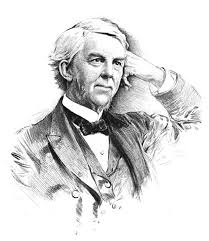
|
| Oliver Wendell Holmes |
That Penn would have acknowledged some truth to Holmes' position can be surmised from the struggle he had with the argument that solitary contemplation cannot lead to an organized moral code of behavior within a society. The example of his time was the Hippie generation, is a more familiar example. What is to prevent a society which depends on silent introspection from concluding that monogamy,personal Hygiene,, and recreational drug avoidance are useless intrusions into the joy of personal freedom? Responses having to do with sexually transmitted disease, harm to the education and welfare of unparented children, disagreeable responses to the undesirable body odors of others, and the spread of addiction by example to those who wish to minimize unnecessary temptations, are all examples of hostility by others who may not have achieved equal illumination from their inner lights. Over centuries of observed experience, societies have reached comparatively similar views on what behavior should be prohibited by force, or discouraged by social pressure. Societies which reach these conclusions may hold themselves open to discussion, but often assert a right to punish those who violate the codes without offering plausible arguments beyond merely mystical ones, closed to debate.
Penn's response to such critiques was of the nature of insisting that Quakers obey the law unless the law insists on behavior prohibited by their religion. Within the realm of unwritten societal pressures, Penn was more relaxed. Sometimes he urged bizarre behavior having to do with hats and clothing, as a silent reproach to society on some issue, but in general, he urged that Quakers consider themselves Protestant Christians as a general guide to behavior. A century after he died, most Quakers were abandoning plain dress and plain speech as not plain at all, but ostentatious. Pointless and therefore ostentatious eccentricity could be harmful to the occasional truly important witness about such things as conscientious objection to war. If the considered purpose is to be taken seriously, eccentric behavior about trivial issues is to be avoided.
A Brief WILLIAM PENN CHRONOLOGY, 1644-1718
Born October 14,1644, in Tower Hill, London, England. Father Sir William Penn, Admiral who conquered Jamaica for King Charles II. Mother, Margret Jasper Vanderschuren, daughter of a Dutch merchant.
Education: Protestant Academy, Chigwell School, Oxford, Christ Church
Published a plan for "United States of Europe, EuropeanDyet, Parliment or Estates"
1666Joined Religious Society of Friends (Quakers)c.age 22 Outstanding swordsman. but frequent companion of George Fox.
1680 c. May. Petitions Charles II for a colony in America. June. Crown officials begin their consideration of WP's petition.
1681 January-February. Crown officials revise WP's draft of the charter for Pennsylvania.
4 March. Receives his charter for Pennsylvania.
14 March. Son William Penn, Jr. (1681-1720) is born.
April. Appoints William Markham as deputy-governor of Pennsylvania.
Writes Some Account of Pennsylvania, his first advertising pamphlet.
Spring-summer. Begins work on his constitution for Pennsylvania.
June. Begins lobbying to secure the lower counties (Delaware) from the Duke of York.
July. Announces his plan of land distribution in Pennsylvania.
July-August. Publishes a Map of Pennsylvania.
Takes his first land selling trip to Bristol.
August. His deputy governor arrives in Pennsylvania.
16 September. Writes to planters in Maryland, claiming the northern quarter of that colony.
September-October. Sees his first settlers and land commissioners off to Pennsylvania.
October. Writes a letter of friendship to the chiefs of the Delaware Indians.
1682 January-April. WP and Thomas Rudyard complete the first constitution and laws for Pennsylvania.
February-March. The Free Society of Traders founded.
c. 1 March. His mother, Lady Margaret Penn, dies.
25 April-5 May. Publishes his Frame of Government and Laws Agreed upon in England.
15 July. His agents conclude their first deed with the Delaware Indians.
24 August. Receives the deeds to the lower counties (Delaware) from the Duke of York.
30 August. Sails for America on the Welcome.
28 October. Lands at New Castle, Delaware.
October-November. Visits Chester, Pennsylvania, and the site of Philadelphia.
November. Visits New York and East New Jersey.
December. His first Assembly convenes at Chester.
Meets with Lord Baltimore concerning the Maryland-Pennsylvania boundary dispute.
Twenty-three ships arrive in 1681 -1682; the colony grows rapidly.
1683 January. Quakers begin meeting in Philadelphia; the Philadelphia County Court is established.
March. Visits East New Jersey and sits on its Council. Begins distributing large numbers of Philadelphia lots. His second Assembly approves a revised Frame of Government. 29 May. Meets with Lord Baltimore at New Castle. Spring-summer. Acquires his country manor Pennsbury, in Bucks County.
August. Writes Letter to the Free Society of Traders.
August-September. Tries to buy Susquehanna Valley lands from the Iroquois, but is blocked by New York's Governor Thomas Dongan.
September-November. Many ships arrive; both Philadelphia and Pennsylvania continue to expand.
October. Germantown surveyed.
November. Attempts to collect his quitrents.
1684 March. The Welsh Tract surveyed.
April-May. Decides to return to England to defend his boundary against Lord Baltimore.
May. Lord Baltimore leaves for England.
The Assembly passes an excise tax, which WP suspends.
July. Philadelphia's waterfront residents protest WP's city land distribution policy.
August. Prepares to leave for England; appoints Thomas Lloyd president of the Provincial Council.
18 August. Sails for England from Lewes, Delaware.
5 October. Lands at Worthing, Sussex.
October. Writes to Thomas Lloyd to get copies of documents needed for his defense against Lord Baltimore.
Meets with Charles II and the Duke of York.
December. The Lords of Trade postpone the hearing of the Penn-Baltimore controversy.
Died July 30, 1718, Ruscombe, UK.
William Penn, Excellent Lawyer, Terrible Businessman
Richard Dunn, who with his wife Mary Maples Dunn stand as the two core authorities on the life of William Penn, merely smiles when asked to describe what Penn was really all about. "What we need is to have one good biography emerge," said he, "but it isn't easy to guess what it will say". For the present, let's just sketch a few paradoxes which somehow need threading together.
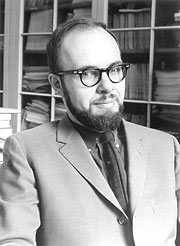
|
| Richard Dunn |
In the first place, the wealth of William Penn can only be described as prodigious. His father had played a central role in restoring the Stuart monarchs, and in the course of it had conquered for the Crown the enormously valuable property of the Island of Jamaica. For these efforts, the father had been rewarded with extensive properties in Ireland and a highly influential position at Court. To all of this was overgenerously added as debt repayment, the American territories which have now become the states of Delaware, New Jersey, and Pennsylvania. Actual ownership of some of this was shared with others, but all of it was quite effectively controlled by young William. No one else stands even close as the largest private landholder in American history. But to appreciate the immensity of his wealth, it should be understood that he treated this property as a sort of hobby. Over the course of his lifetime, the colonies lost money, and Penn subsidized them rather seriously from his other assets.
At the same time, Penn lived vastly beyond his income in ordinary ways, becoming heavily indebted, eventually going to debtor's prison. It probably was not necessary; his sons renounced Quakerism and made a profit on the colonies after they inherited them. Although he could display remarkable organizational talent, particularly in the organization of New Jersey, his management was mostly slack, his judgment of agents often proved too trusting, and he permitted himself to be exploited by poorly-designed contracts to his eventual financial ruin. Even that might not have been serious; he displayed a towering legal mind in the devising of the doctrine of jury nullification and was the winner in a great many lawsuits. He even demonstrated he was capable of winning dubious lawsuits, soundly defeating Lord Baltimore in a border dispute over Maryland which others have said showed Baltimore had the stronger case. We know he had influence at Court, and such legal victories suggest he might on occasion have taken full advantage of it.

|
| Gulielma Maria Springett Penn |
From the sound of things, some have concluded Penn was so rich and powerful he grew careless about his own best interests, which essentially needed very little defense. In particular, he gave this impression to his fellow Quakers, who concluded he did not need nor likely would stoop to collecting what he was owed in taxes and property sales. This cavalier attitude encouraged the early Quaker merchants to follow their own advantage without shame, and as it happened with great vigor. The Constitutions he devised for the colonies are frequently cited as the brilliant cornerstones of fairness and stability, ultimately the models for much of our present Constitution. Penn really was sincere in wanting to provide a better life for the working people than they could have at home in England. But in the Seventeenth Century, the modest role he devised for the Proprietor commanded little respect and was not one his aggressive clients would have chosen for themselves in his position. Perhaps the most generous description of their passive aggression would be that he taught power and governance to be the collective possession of the whole Quaker meeting, so the leaders of the meeting simply took him at his word. For their part, there can be little doubt of their commercial talents; trade and industry immediately thrived in the colony. However, sharp, aggressive trade and commerce were not things a gentleman would himself want to associate with.
Unfortunately, the historical records of the early colonies are not good; for the most part, we have to surmise the struggles and frictions between a rich, financially careless, and sincerely earnest theologian in his contention with a group of poorly educated strivers who had been told he regarded each of them to be his equal. As the saying goes, he was rich beyond denying. And therefore, he was probably arrogant beyond his own ability to see it as a flaw.
Equal before the law, perhaps, and equal in the prayers of First-day Meeting. But everything about his upbringing, his social circle in London, and his staggering wealth suggested that even a saint would have trouble believing, deep in his heart, that these were truly his equals. And even if perchance he did believe it, they would not have believed it for a moment, had their positions been reversed. Penn certainly acted as though he believed in religious freedom, serene in the idea that if every person earnestly thought hard about ethical issues, everyone would eventually reach about the same conclusion. The elders of the meeting, however, behaved in ways which suggested they would personally prefer non-Quakers to settle somewhere else, and given half a chance would create Quakerism as an established church. There seemed to be those who felt that Friend William was perhaps a little too trusting. And anyway there were some obvious paradoxes. William Penn kept personal slaves.
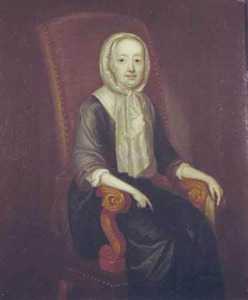
|
| Hannah Callowhill Penn |
With two wives, William Penn had thirteen children. Among them was considerable diversity of opinion, along with the same tendency to rebellion found in any two generations. Early illnesses and chance led to the emergence of those children who renounced Quakerism and showed no shame at all about wanting to have money in order to spend it recklessly. One would have supposed that a man of Penn's intellectual stature would have been able to control his family better, but his own reckless youth had been so extreme that he had few arguments available when, as seems virtually certain, rebellious children defended themselves by reminding him of his own indiscretions. William Penn displayed absolutely no sense of humor; a touch of it would have been useful in mastering a family and friends who were undoubtedly having a little trouble knowing what to make of this apparition in their midst. Some equally pompous Pennsylvania merchants might have had difficulty denying that in their passive aggression, they occasionally resembled the spoiled brats with whom he found he had ample family association.
REFERENCES
| Remember William Penn, 1644-1944: A Tercentenary Memorial : Edward Martin: ISBN-13: 978-1258369934 | Amazon |
Not Only to Own, but to Govern
And him the said William Penn his heires and As-signes Wee doe by this our Royall Charter for us our heires and successors make, create and constitute the true and absolute Propriertaries of the countryes aforesaid and of all other the premisses, saveing alwayes {to us our heirs and successors} the Faith and allegiance of the said William Penn, his heires and Assignes, and of all other {proprietaries, tenants and inhabitants that are, or shall be, within the Territories and precincts aforesaid, and {saving alsoe every unto us our Heirs and successors, the sovereignty of the aforsd country} the sovereignty Dominion thereof due unto us our heires and successors, To have, hold, possesse and enjoy the said Tract of Land, Country, Isles, Inletts and other the premisses, unto the said William Penn his heires and Assignes. To the only proper use and behoof of the said William Penn his heires & Assignes forever To be holden of us, our heirs and successors, Kings of England as of our Castle of Windsor in our County of Windsor, Berks, in Free and common Soccage, by fealty only for all Services and not in Capite or by Knights Service, Yeilding and paying therefore to us our heirs and successors Two Beaver skins to be delivered {at our said Castle of Windsor} on the First day of January in every year if demanded. And also the Fifth part of all gold and silver Oar which shall from time to time happen to be found within the limitts aforesaid {clear of all charges}. And of our further grace, certain knowledge, and mere motion wee have thought fit to erect and wee doe hereby erects the {afore}said Country and Islands into a province and Seigniory and doe call it Pennsylvania and so from henceforth we will have it called Pennsylvania. And forasmuch as we have hereby made and ordained the aforesaid William Penn his heirs and Assigns, the true and absolute Proprietaries of all the Lands and dominions aforesaid Know yee {therefore} that wee reposting special trust and confidence in the fidelity, wisdom, Justice, and provident circumspection of the said William Penn for us our heirs and successors Doe grant free full and absolute power by virtue of these presents to him and his heirs and to his and their Deputies and Lieutenant for the good and happy government of the said Countries to ordain, make, enact and under his and their seals to publish, any Laws whatsoever for the raising of money for the public uses of the said Province or for any other end appertaining either unto the public state peace or safety of the said Country or unto the private utility of particular persons according unto their best discretions by and with the advise, assent, and approbation of the Freemen of the said Countries or the greater part of them or of their
Delegates or Deputies whom for the enacting of the said Laws when and as often as need shall require {x} Wee will that the said William Penn and his heirs shall assemble in such sort and forme as to him and them shall seem best and the same Lawes duly to execute unto and upon all people within the said countries and limits thereof {x x}. And we do likewise give and grant unto the said William Penn and his heirs, and to his and their Deputies and Lieutenant, full power and authority to appoint and establish any Judges and Justices Magistrates and officers whatsoever for what Causes soever for the probates of wills and for the granting of Administrations within the precincts aforesaid, and with what power soever and in such forme as {to} the said William Penn or his heirs shall seem most convenient. Also to remit release, pardon, and abolish, whether before Judgment or after, all Crimes and offenses whatsoever committed within the said Country against the said Laws Treason and willful and malicious murders only excepted and in those cases to grant reprieves until our pleasured may be known therein and to do all and every other thing and things which unto the complete establishment of Justice unto Courts and Tribunals formes of Judicature and manner of proceedings doe belong, Altho in these presents express mention be not made thereof And by Judges by them delegated to award proc-esse hold, please, and determine in all the said Courts and Tribunal all actions suits and causes whatsoever as well Criminal as Civil, personal, real and mixt, which Laws so as aforesaid to be published. Our pleasure is and so we enjoy, require, and command shall be most absolute and available in Law and that all the Liege people {and subjects} of us our heires and Successors do observe and keep the same unavoidably in those parts so far as they concern them under the pain therein expressed {or to be expressed}, Provided Nevertheless that the said Laws be consonant to reason and bee not repugnant or contrary but as near as conveniently may be agreeable to the Laws, Statutes, and rights of this our Kingdome of England. And saving and reserving to us our heirs and successors the receiving, hearing, and determining of the appeal & appeals of all or any person or persons or in or belonging to the Territories aforesaid, or touching any Judgment to be there made or given And forasmuch as in the government of so great a Country sudden accidents doe often happen, whereunto it will be necessary to apply a Remedy before the Freeholders of the said Province or their Delegates or Deputies can be assembled to the making of laws, neither will it be convenient that instantly upon every such emergent occasion so great a multitude should be called together. Therefore for the better government of the said Country wee will and ordain, and by these presents, for us, our heirs and Successors Doe grant, unto the said William Penn and his heirs by themselves or by their magistrates and Officers in that
behalf duly to bee ordained as aforesaid to make and constitute fit and wholesome ordinances from time to time within the said Country to be kept and observed as well for the preservation of the peace as for the better government of the people there inhabiting and publicly to notify the same to all persons who the same doth or anyway may concern Which ordinances our will and pleasure is shall be kept {observed} inviolably within the said Province under pains therein to be expressed {[illegible deletion]}. Soe as the said ordinances be consonant to reason and bee not repugnant nor contrary but so far as conveniently may be agreeable with the Laws of our Kingdome of England and so as the said Ordinances be not extended in am sort to bind charge or take away the right or interest of any person or persons of or in their Life, members 2' Freehold goods or Chatties. And our further Will and pleasure is that the [illegible deletion] Laws for regulateing and governing of propertie within the said province as well for the descent and enjoyment of Lands as likewise for the enjoyment and possession {succession} of goods and Chatties and likewise as to the treasonc and {to} Felonies shall be and continue the same as they shall bee for the time being by the generall course of the Law in our Kingdome of England untill the said Laws shall bee altered by the said William Penn his heires or Assignes and by the Freemen of the said Province their Delegates or Deputies or the greater part of them {x x x And to the end the said William Penn or his Heirs, or other the Planters, Owners, or Inhabitants of the said Province, may not at any time hereafter, by misconstruction of the Powers aforesaid, through inadvertancy or design, depart from that faith & due allegiance wch bv the Laws of this Our Realm of England, they & all Our subjects in Our Dominions & Territoryes always owe to Us, our Heirs, & Successors, by color of any Extent or Largeness of [illegible deletion] {Powers} hereby given, or pretended to be given, Or by force or color of any Laws hereafter to be made in the said Province {by virtue of any such Powers} Our further Will & Pleasure is, That a Transcript or Duplicate of all Laws, wch shall be so as aforesaid made &: published, within the said Province, shall within 5. years after the making thereof be transmitted & delivered to the Privy Councill for the time being of Us, Our Heirs & Successors. And if any of the said Laws, within the Space of 6. months, after that they shall be so transmitted &.- delivered be declared by Us, Our Heirs, or Successors, in Our or their Privy Councill, inconsistent with the Sovereignty or lawful Prerogative of Us, Our Heirs, or Successors, or contrary to the Faith & Allegiance due by the Legal Governm1 of this Realm from the said Wm Penn, or his Heirs, or of the Planters or of the Planters, & Inhabitants of the said Province, And that thereupon any of the said Laws shall be adjudged & declared to be void by Us, Our Heirs, or Successors, by order of their, or Our Privy Councill, or by our or their
Signet & Sign Manuel, that, {under our or their Privy Seal } then, & from thenceforth, such Laws concerning with such Judgement & Declaration shall be made, shall become void, & other ways, the said Laws so transmitted shall remain & stand in full force, according to the true intent & meaning thereof.
Freedom, But Not Independence
Pennsylvania Likes Private Property Private
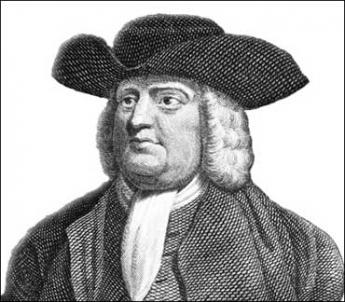
|
| William Penn Holding his Charter |
William Penn was the largest private landowner in America, maybe the whole world. He owned all of Pennsylvania, with the states of Delaware and New Jersey sort of thrown in. Although he and his descendants tried actively to sell off his real estate from 1684 to 1783, they still held an unsold three-fifths of it at the conclusion of the Revolutionary War, which they were forced to sell to the state for about fifteen cents per acre. This bit of history partly explains both the strong feeling this is private, not communal, land despite the existence of 2.3 million acres of the state forest system, which is affirmed right alongside the rather inconsistent feeling that raw land is somehow inexhaustible. Early settlers regarded the center of the state as poor farmland, particularly when compared with soil found in Lancaster and Dauphin Counties, or anticipated by settlers going to Ohio and Southern Illinois. A complimentary description is that glaciers descended to about the middle of Pennsylvania, denuding the northern half of topsoil which was then dumped on the southern part as the glaciers receded. Even today, farmers tend to avoid the northern region if they can, reciting the ancient advice from their fathers that "Only a Mennonite can make a go of it, around there."
So, lumbering had a century-long flurry in Central Pennsylvania, exhausting the trees and moving on. But that only related to the top layer of soil; beneath it lay anthracite in the East, and bituminous coal in Western Pennsylvania, supporting the steel industries of the two ends of the state with exuberant railroad development. Even today worldwide, hauling coal is the chief money-maker for railroads. The resulting availability of rail transport promotes the location of heavy industry near coal regions; the 20th Century decline of coal demand ultimately hurried the decline of heavy industry in the state by impairing the railroads.
Beneath all this lie the aquifers, porous caverns of fresh water. And beneath that, largely unsuspected for two centuries, lie the sedimentary deposits of a huge inland sea, compressed into petroleum which evaporates into natural gas. All of this is held by huge deposits of semi-porous shale rock, now mostly 8000 feet deep, stretching from Canada to Texas and called the Marcellus shale formation. If it can be economically recovered, there is more natural gas than in Arabia, and there is a similar formation along the near side of the Rocky Mountains in Colorado, stretching up to the Athabasca tar sands in Canada. There is another similar formation in France underneath Paris. No doubt, we will find the whole world has similar huge deposits for which the main problem has always been: how do you get it out?
There's another question, of course, of who owns it. Those who clearly do not own it maintain that everyone owns it. In the western world, most particularly in America, it is our firm belief that if you live on top of it, you own it. Since it is expensive to extract, quarrels like this are usually settled by purchasing mineral rights from the surface owner, who generally could not possibly extract it by himself. Those who assert they have a conflicting right to it because it belongs to everyone can expect belligerent resistance. At the present time when America faces a critical fifteen year period of dwindling oil supply, ultimately relieved by perfecting alternative energy sources, there is too little time to achieve consensus for any other governance theory. The problem which could possibly gain enough traction to interfere is the issue of potential damage to others which might result from the extraction of this subsurface treasure. Because of the apparent urgency of a decision to extract or go elsewhere to extract, the best we can hope for is some fairly rough justice.
A Pennsylvania Farmer in Delaware
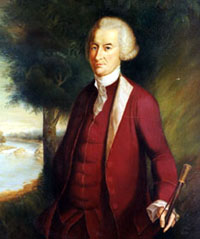
|
| John Dickinson |
It is difficult to have a coherent view of the mind of John Dickinson. Seriously offended by the Townshend Acts, he rightly perceived them to be the work of a few malignant personalities in British high places who would mostly soon be replaced. Later on, he refused to be troubled by the inconsequential Tea Act, which he appraised as a face-saving gesture of reconciliation, but more recent historical information demonstrates was more likely aimed at avoiding an unrelated vote of no-confidence in Parliament. Unfortunately, Dickinson was too remote from these events and additionally could not comprehend reckless hotheads among his own neighbors. Reckless hotheads in turn seldom comprehend the measured meekness of Quakers. In any event, although Dickinson played a major role in the Declaration of Independence, he refused to sign it when the time came, evidently sensing an opportunity to separate the three lower counties from Pennsylvania and its Proprietors. A few months later when the British actually invaded the new State of Delaware on the way to capturing Philadelphia by way of Chesapeake Bay, Dickinson enlisted as a common soldier and fought at the Battle of Brandywine. Obviously, he was seriously conflicted.

|
| John Dickinson's Farmhouse |
Dickinson had become internationally famous for twelve letters he had meant to publish anonymously. The Letters From a Pennsylvania Farmer were written about 1768 out of resistance to the Townshend Acts. Because the three counties which were to become the State of Delaware were then still part of Pennsylvania, many school children have become understandably confused about the actual location of the man who became governor of both states, simultaneously.
The causes of the separation of the two colonies are still a little vague. Delaware schoolchildren are taught the two states separated, but often report they didn't retain much information about why it happened. The Dutch and Swedes who originally settled southern Delaware were not sympathetic with Quaker rule, which could be seen as a reaction to their living here for generations as Dutchmen before William Penn arrived, but then saw the colony sold out from under them. As a further conjecture, there might have been friction with the Quakers over slavery, similar to the hostility of other Dutch settlers in northern New Jersey when William Penn purchased that area. This pro-slavery attitude resurfaced in both areas during the Civil War. One alternative theory which has considerable currency in Delaware is local dissension about Quaker pacifism during the Revolutionary War. On a recent visit to Dickinson's home outside Dover, a school teacher was overheard to instruct his flock that the Dutch Delawarians wanted to fight the British King, but the Quakers wouldn't give them guns. "We value peace above our own safety," was the unsatisfying response they received from the Pennsylvania Assembly. But that line of reasoning bumps up against Dickinson's role in local affairs, his ambiguity over the Declaration, and his vacillation in warfare. One would suppose the simultaneous Governor of both states would play a major role in the separation of the two.

|
| over Air Force Base |
Dickinson's plantation, quite elaborately restored and displayed, is tucked behind the Dover Air Force Base. Perhaps all that aircraft noise will discourage sub-development in the area of Dickinson's plantation and the rural atmosphere may persist for years. At the time of the Cuban missile crisis, your correspondent happened to be driving past, observing the sky filled with bombers, just circling and circling until the diplomats settled matters. Since eight-engine bombers are seldom seen around Dover, it has always been my presumption that they came from elsewhere to be refueled at Dover; but that's just a presumption. One of the pilots later told me he was carrying nuclear "eggs" and was completely prepared to take a long trip to deliver them.
To get back to Dickinson's wavering about the Declaration, maybe there was a good reason to waver. Joseph J. Ellis (in His Excellency, George Washington) relates that after the devastating British defeat at the Battle of Saratoga, Lord North made an offer to settle the war on American terms. In a proposal patterned after the concepts of the separatists in Ireland, America could have its own parliament as long as it maintained trade relationships with England. As an opening offer, that comes pretty close to what the colonists had been demanding. Governor Morris was active in disdaining this offer, although it is unclear whether he was acting alone or as the agent of others. The offer came too late to be accepted, but it might have shortened the war by six years, and we might now have a picture of the Queen on our postage stamps.
REFERENCES
| His Excellency: George Washington: Joseph J. Ellis: ISBN-13: 978-1400032532 | Amazon |
| Letters From A Farmer In Pennsylvania To The Inhabitants Of The British Colonies (1903): John Dickinson: ISBN-13: 978-1163969533 | Amazon |
Advantages and Disadvantages of Being a Small Country
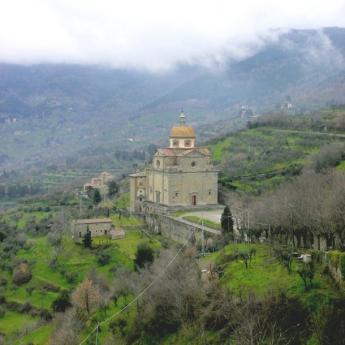
|
| very pleasant |
LIVING in a small country seems to be very pleasant, and many people prefer it to the hustle, bustle and high taxes of living in a large country. Unfortunately, big neighbors are tempted to conquer and enslave you. Aside from this one disadvantage, many people would prefer a simple, quiet life among blood relatives, all tending to think the same way. It's one step above tribalism, and maybe it's a form of peaceful tribalism.

|
| Measles |
But our evolutionary ancestors didn't think they could afford this luxury. They lived in a strange wilderness filled with fierce aborigines who often took a notion to scalp you, even if you were willing to become a hunter-gatherer like them, because they scalped other hunter-gatherers, too. And they were good at making war. Later historians sometimes contend that European settlers only gained a foothold in the New World because the Indians had been weakened by smallpox, measles, and other contagions which advanced ahead of the exploring Europeans. English settlers along the Atlantic coast were able to overcome the Dutch and Swedes who preceded them, but the French in Quebec and the Spanish in Florida were a greater threat. Worst of all enemies were the rulers of England, who seemed to think it was natural to enjoy the benefits of the New World without the nuisance of living there. A century or more of conflict from the enemies who surrounded them had pretty well convinced the English Atlantic settlers that they simply had to get bigger and stronger. Otherwise, one of the many enemies surrounding them would eventually succeed in what seemed to be a universal goal: conquest.
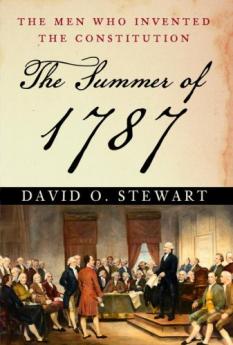
|
| The summer of 1787 |
The colonists had learned one other thing. Their own loose federation of small peaceful states was in some ways worse than rule by an outside King. The Confederation had been constantly reluctant to surrender local power to a unified defense; almost by definition, an invader was better disciplined than the defenders of a loose tribal alliance. The defense alliance had few advantages for keeping local bickering under control and was definitely less effective with families and children to protect against a mobile force of adult male warriors. The Confederation barely held together during an eight-year war against a common enemy, and it was rapidly coming apart after peace was declared in 1783. The English and French could see all this, too. Once they settled their own war with each other, each of them planned to envelop the former colonies. So George Washington and James Madison gathered the Best and the Brightest together in Philadelphia in the summer of 1787, intending to construct a practical plan for what almost all the colonists wanted: a Union. A Union strong and big enough so other nations would leave them alone. A Union was benign enough so its citizens would enjoy the same Liberty they had as a loose alliance. Divided informally into four interest groups, each of the four needed concessions to be made. But each also needed to leave the other three feelings they had gained something important as the price of surrendering to what some other group could not do without. Having found the vital concessions, it was then still necessary to tinker and re-balance, so that everyone could still "live with it". In essence: 1) The South had to be given time and forbearance to work out its difficult problem of slavery, moral qualms notwithstanding. 2) The nine small states had to be protected against perpetual domination by the three big ones, of Virginia, Pennsylvania, and Massachusetts. 3) If America was to realize the full advantage of growing from thirteen states to fifty, existing old states must not take advantage of new ones. 4) Political revolution was not the end of it; there was also the Industrial Revolution. Fishing, lumbering, farming, trade, and cotton, would in some way need to accommodate banking and manufacturing, assisting rather than upsetting other compromises. Given these tangled issues, it would be a long, hot summer in Philadelphia.
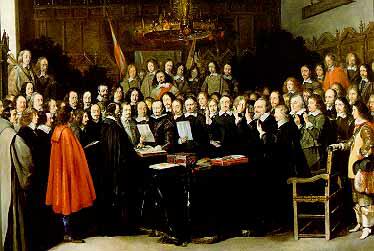
|
| Treaty of Westphalia in 1648 |
Three of the four main problems were obvious, demanding to be addressed. Slavery was obvious from the start; you either solved this problem or the South would walk out. The western wilderness was bigger than existing America; it too could not be ignored. And finally, huge variations of climate and resources led to local specialization; a marvelous thing, if you could trust your suppliers and customers to cooperate. But curiously, none of these issues got directly to the political problem the Constitutional Convention was meant to solve, which was unifying thirteen different sovereignties, each of which was prepared to get up and walk out. The modern nation state was created by the Treaty of Westphalia in 1648; its guiding principle was mutual respect for local sovereignty. Having pacified over a hundred contentious central European states, it required a great deal of self-assurance for anyone to flout it. It seemed hard to imagine any way to remain sovereign, without commanding a vote equal to that of other sovereignties. The delegates from the State of Delaware, which had separated from Pennsylvania within the past decade, were "prohibited [by their legislature] from changing the Article in Confederation establishing an equality of votes among the States". Just what agitated the minds of the Legislature of Rhode Island was kept private, but something about a Union bothered them so much they refused to send delegates to Philadelphia even to discuss Union. After they assembled and started having dinner together at taverns, and later as they were beginning to vote in coalitions, one thing began to emerge. The small states banded together, hung out together, talked alike, and began to vote alike. Their emerging leader was John Dickinson of Delaware, the author of the Articles of Confederation, and very likely one of the prime agitators in the lower three counties of Pennsylvania -- breaking off from Pennsylvania and becoming the State of Delaware. Furthermore, Dickinson had been Governor of both Delaware and Pennsylvania, so he was very familiar with the deplorable behavior of the Legislature of Pennsylvania, now and for decades in the past. It took a long time for this sly old political operator to show his cards, but when he did, he gave James Madison the shock of his life. Madison, the near neighbor of George Washington and leader of the Virginia delegation, the author of the Virginia Plan, and the clear authority on the politics of government in America was busily consumed with working out the details of the emerging Constitution. Obviously, it went to his head a little, and so he was dumbfounded when Dickinson drew him aside in the corridor to tell him he wasn't going to have a Constitution at all. Dickinson was walking around with the votes in his pocket of five or six of the nine small states and was telling Madison that the small states were fed up, and not going along. Young Madison was suddenly confronted by the most respected lawyer in America, whose timing was perfect. For what may have been the first time in his life, Dickinson fully revealed the depth of his annoyance, that the big states would always take the little ones for granted. That the little ones were always expected to be deferential to the big fellows in charge of the big states. And then the clincher: "I would rather risk conquest from a foreign state than being forever dominated by my larger neighbors." That put it in a nutshell. If the only reason for joining a Union was to be protected from foreigners, Dickinson wasn't so sure he preferred his coalition partners. Evidently, this was the feeling of most of the other small states at the Convention, and it may well be the feeling of all small states, anywhere and everywhere.
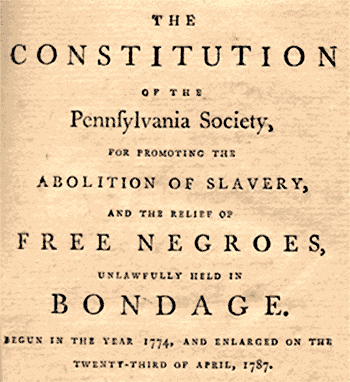
|
| Promoting the Abolition of Slavery |
Once the Convention got the idea, solving it became comparatively easy, but why waste an opportunity? There is a good reason to suppose it was Ben Franklin, silent as a cat watching a mouse, who matched it up with slavery. His fellow Pennsylvania delegate, James Wilson, had prepared the way by starting the discussion of granting 3/5 representation for slaves, but it had received comparatively little notice in the previous few weeks. Franklin rammed it home, adding a sop to the large states by according to the House of Representative sole power to introduce money legislation. Two of the main issues of the convention were solved with one agreement, small-state representation, and slavery. Who can say how long he had been nursing this idea. He had agreed to be president of the Pennsylvania Society for Promoting the Abolition of Slavery, about a month before the Constitutional Convention began. Prior to that, he and his wife had owned a slave or two, for many years. On June 2, the society adopted a resolution to end the slave trade and presented it to Dr. Franklin, asking him to present it to the Convention. He never did, explaining later it was "advisable" to let the matter lie over. In August, Alexander Hamilton blocked a similar resolution from the New York Manumission Society, even though he had been a fervent lifelong opponent of slavery.
Navigation and Mineral Rights
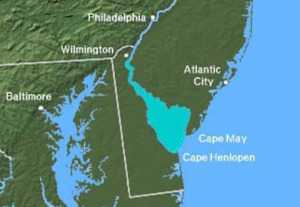
|
| Delaware Bays |
Wee doe also give and grant unto the said William Penn his heires and Assignes The free and undisturbed use and continuance in and passage into and out of all and singular Ports, Harbours, Bayes, Waters, Rivers, Isles and Inletts belonging unto and {or} leading to and from the Country or Islands aforesaid. And all the Doyle, Lands, Feilds, woods underwoods, mountains, hills, Fenns Isles, Lakes, Rivers, Waters, Rivulets, Bayes and Inletts Scituate or being within or belonging unto the Limits and bounds aforesaid together with the fishing of all sorts of Fish whales {sturgeons} and all Royall and other Fishes in the Sea Bayes, Inletts, waters or Rivers within the premises and the Fish are therein taken. And also all vines, Mines, and Quarries as well discovered as not discovered, of gold, silver, gems, and other {pretious} stones and all other whatsoever bee it of stones, metals, or of any other thing or matter whatsoever, found or to be found within the Country, Isles, or limits aforesaid.
The Origin of States Rights, a Rumination
ALMOST alone among the British colonies in America, Pennsylvania's western border was specified in the King's charter of the colony. It was "five degrees longitude west of the point where the eastern boundary crosses the Delaware" [River]; however, its actual location on the ground was not actually marked until 1784. It's a few miles west of the present city of Pittsburgh, located at the forks of the Ohio River, where the Allegheny and Monongahela Rivers join. However, until 1784 it was not a certainty that this complex was within Pennsylvania instead of Virginia. The origin of Ohio is at the only major water gap in the North-South mountains, and the tributary rivers are fairly large. The three merging rivers thus form a nearly continuous water route along the base of the mountain range, from the Great Lakes south to Pittsburgh, or from the Chesapeake Bay north to Pittsburgh, and then to the Mississippi, going past the best topsoil farming land in the world. The forks of Ohio were the great prize of the Seventeenth and Eighteenth centuries, the place where young George Washington himself started the French and Indian War. To include these treasures, it seems vaguely possible that William Penn insisted on having the border of his state safely include the water gap at the beginning of Ohio. Perhaps not, of course, perhaps it was just a sense of tidiness on the part of the ministers of Charles II. The original document stated that the border was a hundred miles east of there, to match where Maryland ended. When the document was returned to Penn by the King's ministers, however, it had the new language.
The existence of this north-south termination of Pennsylvania began to take on a new significance when other states made claims for their land grant to extend to the Pacific Ocean, and the extensions collided with each other. Virginia then developed its territory to include modern Kentucky and West Virginia. That resulted in Virginia's land aspirations veering northward, to include the Ohio Territory west of Pennsylvania's fixed boundary. By the legal standards of the day, Virginia had a fairly good claim to all of the Indian territories, not merely to the west of Pennsylvania, but extending at least to the Great Lakes, perhaps farther. Maryland, Connecticut, New York, and Massachusetts had conflicting claims from an infinite extension of their western boundaries. As a consequence, it was impossible to achieve ratification of the Articles of Confederation for five years. The various states involved were fearful of the creation of a combined political entity might result in a court which would be enabled to rule against their individual aspirations. The stakes were high; the land mass involved would be several times as large as England.
The person who finally broke this deadlock might well have been Robert Morris, who was disturbed that this inter-state dissension was injuring his ability to borrow foreign funds for the Revolutionary War. The internal negotiations took place under wartime conditions, and are poorly researched. No doubt some person deserves credit for bringing this wrangle to a close. Virginia had the strongest claim, New York the weakest. New York gave up its claim first, Maryland was the last, and Virginia the most disappointed. Pennsylvania, unable to make a claim, took the position that the land belonged to everyone, and eventually was mollified by getting a small notch of land extending to the Great Lakes at Erie. It must be noticed in passing that final resolution of the land claims came at the Treaty of Paris ending the Revolution. Benjamin Franklin, soon to become President of Pennsylvania, was the negotiator of the treaty which reflected Pennsylvania's position that the land belonged to all of us, right?
Even without these western land claims, Virginia was the largest and richest of the colonies, and rather easily adopted the attitude that Virginia would be the leader of the new United States. From their viewpoint, the preservation of states rights would enhance Virginia's leading the country. More or less immediately, the attitude of small states like Delaware hardened into resistance that this must not happen. Much otherwise inexplicable behavior also begins to make a sort of sense: the perverse behavior of the Lee family in the Continental Congress, the quarrels within George Washington's cabinet, the relocation of the capital and the dreams of the Potomac as the nation's main portal of transportation, the rise of Jefferson's political party, the obstructionist behavior of Patrick Henry, the Virginia domination of the Presidency for decades, and countless less famous episodes of history -- make more sense as residuals of Virginia's early land aspirations, than as defenses of slavery or philosophical convictions that states were somehow superior to nations. These suspicions are difficult to clarify and impossible to prove. The best way to see some substance to them is to imagine yourself in the Virginia House of Burgesses, politically connected and vigorous, able to imagine your descendants all inheriting a county or two of rich land as a remote consequence of a few glamorous deeds by their Cavalier ancestor.
Unalienable Rights Before 1776
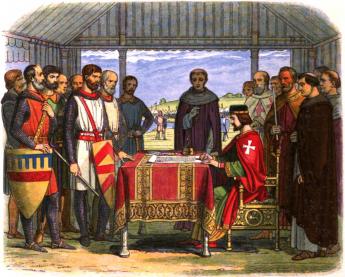
|
| Magna Carta |
In 1976, the bicentennial birthday celebration of the Declaration of Independence contained two major exhibits of its conceptual origins. Mr. H. Ross Perot of Texas loaned his copy of the 1215 Magna Carta, and the Proprietors of West Jersey loaned their 1677 original of William Penn's Concessions and Agreements to the colonists of New Jersey. The purpose of the exhibit was to emphasize the historical origins of the concepts within the Declaration, but even the language of the Concessions is remarkably similar, quite evidently lifted by Jefferson when he was writing. On one point, Penn had the better of Jefferson; he correctly wrote about inalienable rights, while somehow Jefferson gave us unalienable ones.
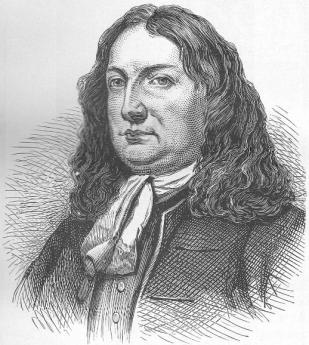
|
| William Penn |
The matter came up recently at a Socrates meeting of the Right Angle Club, where at least one member felt there was no such thing as a natural right, while others wavered. In discussing the rights which the Creator, William Penn and/or Thomas Jefferson may have given us, the various contexts must be held in mind. At the time of declaring our intention to sever relations with Britain's King, there was no Constitution to refer to as a source, and it was impolitic to assert the rights had been given by English kings, like King John. Therefore, the language cleverly short-cuts around the divine right of kings to make a direct connection between the Creator and the colonists. William Penn on the other hand, was a real estate promoter, offering enticements and assurances to prospective colonists who were naturally fearful of risking their lives in sailboats, only to face the possible tyranny of a vassal king who might be even worse than the anointed one. Not only did Penn renounce any suggestion of a Royal role for himself, but went to considerable length describing the legally binding concessions and agreements he was offering. The right of trial by jury, for example, became a right to be punished only by a jury of twelve of one's neighbors. He wasn't talking to lawyers, he was making important distinctions very clear to laymen. These were not rights given by a Divinity who could be trusted, nor something which grew out of Mother Nature. They were the personal promises of William Penn, in personal legal jeopardy of the English courts if he reneged on them. He even had a ready answer for those who discovered the religious language in legal documents -- the Quaker belief that, occasional appearances to the contrary notwithstanding, There is That of God, in every man.
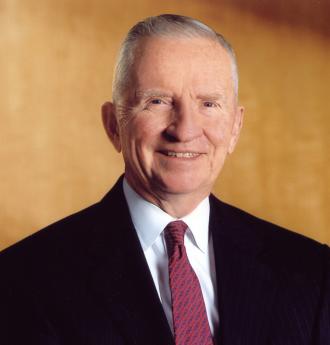
|
| H. Ross Perot |
As a small sidelight of the Concessions document, it had long been housed in the little brick hut on Main Street in Burlington NJ, where the Proprietors of West Jersey keep their treasures. The obscurity of these papers was probably their best protection, but the risk of displaying them in Philadelphia at the centennial brought out the need to ensure them, hence to appraise their value. The figure of four million dollars was kicked around. Ross Perot might have felt comfortable with this sort of expense as the natural cost of being a rare book collector, but it seemed highly unnatural to Quakers. Sometime afterward, the Surveyor General, William Taylor, was awakened by a call from Burlington neighbors that someone was trying to break in the roof to steal contents of the Proprietorship building. The burglars were unaware that underneath the shingles, the roof was actually made of concrete a foot thick. So the perps were frustrated in their aims, but Bill Taylor was greatly troubled by the implications, actually unable to sleep at night worrying about what was in his custody. So, in time the State of New Jersey constructed a suitable archives building, and the valuable documents were transferred up to Trenton. Time will tell what the Soprano State does with such a valuable possession, but at least the Quakers can now sleep at night.
First Amendment: Separation of Church and State
 Amendment 1 Congress shall make no law respecting an establishment of religion, or prohibiting the free exercise thereof; or abridging the freedom of speech, or of the press, or the right of the people peaceably to assemble and to petition the government for a redress of grievances. 
|
| The First Amendment |
Simplified histories of America often declare that other Western Hemisphere colonists mostly came to plunder and exploit; whereas English Protestant colonists came with families to settle, fleeing religious persecution. That's a considerable condensation of events covering three centuries, but it is true that before the Revolutionary War, eleven of the thirteen American colonies approximated the condition of having established religions. Massachusetts and Virginia, the earliest colonies, had by 1776 even reached the point of rebelliousness against their religious establishments. The three Quaker colonies (New Jersey, Pennsylvania, and Delaware) were late settlements, in existence less than a century before the Revolution, and still comfortable with the notion they were religious utopias. While differing in intensity all colonials respected the habits of thought and forms of speech, natural to utopians residing in a religious environment.
Once Martin Luther had let the Protestant genii out of its religious bottle, however, revisionist logic was pursued into its many corners. Ultimately, all Protestant questers found themselves confronting -- not religious dogmatism, but it's opposite -- the secularized eighteenth-century enlightenment. Comparatively few colonists were willing to acknowledge doubts openly about miracles and divinity. However, private doubts were sufficiently prevalent among colonial leaders to engender restlessness about the tyrannies and particularly the rigidities of the dominant religions. To this was added discomfort with self-serving political struggles observable among their preachers, and alarm about occasional wars and persecutions over arguably religious doctrines. Arriving quite late in this evolution of thought -- but not too late to experience a few bloody persecutions themselves -- the Quakers sought to purify their Utopia by eliminating preachers from their worship entirely. Thus, the most central and soon the most prosperous of the colonies made it respectable to criticize religious leaders in general for the many troubles it was believed they provoked.
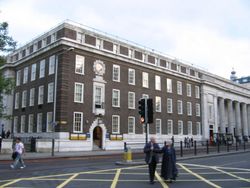
|
| London Yearly Meeting |
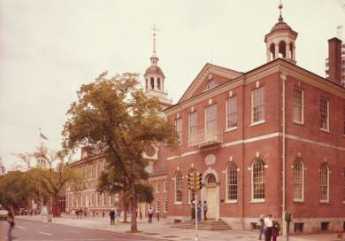
|
| Congress Hall |
In all wars, diplomatic arts and religious restraints get set aside as insufficient, if not altogether failures for an episode of utter barbarism. In the Revolution, some Quakers split from pacifism and became Free Quakers, many more drifted into Episcopalianism, never to return to pacifism. The Constitutional Convention of 1787 was eventually held in this persisting environment; the previous service in the War counted for something, and the great goal was to strengthen the central government -- for more effective regional defense. A great many leaders were Masons, holding that much can be accomplished by secular leadership, independent of religious reasonings. Neither Washington nor Madison revealed much of their religious positions, although Washington the church attender always declined communion; Franklin and probably Jefferson were at heart deists, believing that God might well exist, but had wound up the universe like a clock to let it run by itself. The New England Calvinist doctrines have since evolved as Unitarianism, which outsiders would say theologically is not greatly different from deism. Physically surrounding the Philadelphia convention was a predominantly Quaker attitude; entirely too often, preachers get you into trouble.
When the first Congress finally met under their new constitution, they immediately confronted over a hundred Constitutional amendments, mostly submitted from the frontier and fomented by Jefferson and Patrick Henry, demanding a bill of rights. The demand within these amendments was overwhelming that the newly-strengthened central government must not intrude into the rights of citizens. Recognizing the power of local community action, states rights must similarly be strengthened. Just where these rights came from was often couched in divine terms for lack of better proof that they were innate, or natural. From a modern perspective, these rights in fact often originated in what theologians call Enthusiasm; the belief that if enough people want something passionately enough, it must have a divine source. The newly minted politicians in the first Congress recognized something had to be done about this uproar. Congress formed a committee to consider matters and appointed as chairman -- James Madison. Obviously, the chief architect of the Constitution would not be thrilled to see his product twisted out of shape by a hundred amendments, but on the other hand, a man from Piedmont Virginia would be careful to placate the likes of Patrick Henry. The ultimate result was the Bill of Rights, and Madison packed considerably more than ten rights into the package, in order to preserve the cadence of the Ten Commandments. The First Amendment, for example, is really six rights, skillfully shaped together to sound more or less like one idea with illustrative examples. Overall freedom of thought comfortably might include freedom of speech (and the press), along with freedom of religion and assembly, and the right to petition for grievances. But what it actually says is that Congress shall not establish a national religion. Since eleven states really had approximated a single established religion, the clear intent was to prohibit a single national religion while tolerating unifications within the various states. Subsequent Supreme Courts have extended the Constitution to apply to the states as well, responding to a growing recognition that religious states had the potential to get so heated as to war with each other. No matter what their doctrines, it seemed wise to deprive organized religions of political power as a firm step toward giving the Constitution itself dominant power over the processes of political selection.
At first however it was pretty clear; one state's brand of religion was not to boss around the religion of another state. Eventually within one state, Virginia for example, the upstate Presbyterian ministers were not to push around the Episcopalian bishops of the Tidewater. Madison and Jefferson saw well enough where political uprisings tended to start in those days, in gathered church meetinghouses. In this way, an Amendment originally promoted to protect religions had evolved into a way to ease them out of political power. The idea of separation of church and state has grown increasingly stronger, to the point where most Americans would agree it defines a viable republic. No doubt, the spectacle of preachers exhorting the same nation in opposite directions during the Civil War, settled what was left of the argument.
For Quakers, the most wrenching, disheartening revelation came when they were themselves in unchallenged local control during the French and Indian War. The purest of motives and the most earnest desire to do the right thing provided no guidance for those in charge of the government when the French and Indians were scalping western settlers and burning their cabins. Yes, the Scotch-Irish settlers of the frontier had unwisely sold liquor and gunpowder to the Indians, and yes, the Quakers of the Eastern part of the state had sought to buffer their own safety from frontier violence by selling more westerly land to combative Celtic immigrant tribes. A similar strategy had worked well enough with the earlier German settlers, but reproachful history was not likely to pacify frontier Scots in the midst of a massacre. The Quaker government was expected to do what all governments are expected to do, protect their people right or wrong. To trace the social contract back to William Penn's friend John Locke was too bland for a religion which prided itself on plain speech. Non-violent pacifism just could not be reconciled with the duties of a government to protect its citizens. The even more comfortably remote Quakers of the London Yearly Meeting then indulged themselves in the luxury of consistent logic; a letter was dispatched to the bewildered Quaker Colonials. They must withdraw from participation in a government which levied war taxes. And they obeyed.
Although the frontier Scots were surely relieved to have non-Quakers assume control of their military duty, the western part of the state has still neither forgotten nor forgiven. In their eyes, Quakers were not fit to be in charge of anything. Quaker wealth, sophistication and education were irrelevant; only Presbyterians are fit to rule. A strong inclination toward pre-destination lurks in that idea. Once more, the attractiveness of clear separation of church and state is reinforced.
The French and Indian War in fact had turned out fairly well; most of its victories were located on the European side of the Ocean, anyway. But twenty years later the Revolutionary War turned into a reassertion of the British conquest of all of North America, not merely the part to the west of the Appalachian mountains. To Americans, this came in the form of a demand for taxes to help pay off the costs of a war which greatly benefitted them. The Quaker colonies did not fully sympathize with rebellion, but they had once given up control of a territory larger than England rather than pay war taxes, so they were resistant to both sides in the dispute. Many prosperous and educated Quakers solved their dilemma by fleeing to Canada, but the ardent Quaker proposal for dealing with a coercive British government was not at all impractical. John Dickinson, in particular, argued that since the British motives were economic, success was most likely to come from economic counter-pressure, adroitly leveraged by three thousand miles of intervening ocean. That was shrewd and potentially effective. But the Scots-Presbyterian position was simpler and more direct. If you want us to fight your war, you are going to have to fight to win. The Virginia Cavaliers were probably more likely to win a conventional war if put in charge, but the blunt and almost savage frontiersmen were ideally suited for what has come to be called guerrilla warfare. Washington was a leader, French money was welcome and Ben Franklin was a diplomat, but the clarion call to this particular battle was the voice of Patrick Henry. All in all, the issue of established religion was far more complicated than merely the affirmation of a right to free exercise of religious belief. What united all the colonies was a recognition that, using the church, an arm of the government was just as likely to cause trouble as conducting the state as an instrument of church interests. Eventually, considering how religious America was at the time, there was remarkably little resistance to the firm separation of Church and State in its Constitution.
Money as Political Speech
The U.S> Supreme Court decided, in a case called xxx that campaign contributions were a form of political speech and reaffirmed that corporations were to be treated as individuals. The leaders of the Democratic party maintained they were outraged by such a nonsensical position had been made the Law of the Land, although the contribution of nearly a billion dollars to the 2018 midyear elections soon raised a question of their sincerity in demanding the court reverse its position. Nevertheless, it is clear a sizeable population holds these views. How Congress might reconcile these two appreciable viewpoints remains an open question of unsettled law. The following is an attempt to modify the position somewhat, in order to make the matter less contentious.
Let's begin with a tentative position, whether as a beginning statute, or a beginning Constitutional Amendment: Any political contribution in order to escape taxes, is limited to the equivalent of $100 in 2020 value unless:
Volunteerism Needs a Business Plan
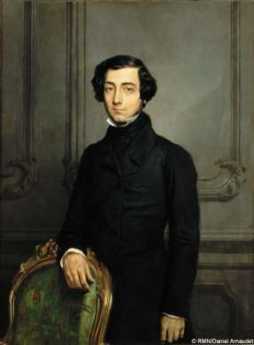
|
| Alexis de Tocqueville |
The visiting Frenchman Alexis de Tocqueville was struck most by the volunteerism he found everywhere in the young American nation; in his view, the first reaction of 19th Century Americans to a problem was to create a volunteer organization to fix it. Benjamin Franklin, who created dozens of such initiatives, was held up as its great exemplar. But de Tocqueville visited us at the beginning of the Industrial Revolution, and we are now well past that into the Information Revolution; volunteerism has noticeably declined. Not only have the great volunteer organizations like the Masons and the Red Cross suffered, but it is far more difficult to enlist the help of others to form a pick-up group to attack some issue or other. It is in that sense the general spirit of volunteerism has declined. The likely difficulty is not selfishness, but the helplessness of people to control their own time.
When volunteer groups to assemble, they are mostly composed of self-employed people like plumbers and dentists, free to be somewhere else during "normal business hours", which although shorter than they once were, seem extended by commuting time and by chores pushed aside during workplace confinement. To some extent longer commuting distances make it physically impossible to do personal chores in the vicinity of the workplace. But constrained personal time is also related to increased control behavior by management. A successful big business has to employ strategies to get employees with cell phones to stick strictly to business while the employer is paying for their time. Now that so many women are going out to work, the family unit needs to struggle to coordinate everyone's work time so there will be some remaining opportunity to conduct family life. When a working couple shares the home tasks and babysitting, the preempted time now extends to two working partners, and what is left is called "quality time". A probably temporary elaboration of this time competition is the need to chauffeur teenagers to their resume-enhancing activities. For the time being, you don't pick a college, the college picks you, and parents desperately labor to assist their children on a career path. Quite obviously, America needs to evolve better ways of trading work at home for more flexibility in the actual workplace, and we also need to build more first-rate colleges, but those issues are not the present topic. To summarize: It's awfully hard to assemble a group of volunteers simultaneously because employers have so successfully assembled their time. Failing to appreciate the tradeoffs inherent in commuting time is a secondary but still important factor, somehow related to the recent housing/schools mania.
Consequently, volunteer organizations increasingly tend to regard their chores as something you hire someone else to do if it proves impossible to dump them on someone who is retired or unemployed, or too timid to refuse. Even nominal volunteers are reluctant to step forward. This leads to recruitment lectures along the line that naturally you must sacrifice if you really truly believe in the goals of the dear old Whatsis Association, surely just a coercive speech pattern. That claptrap was never heard during the age of universal volunteers; volunteering was just one of those things everyone expected to do to get community activities accomplished. We're losing something important if we continue to endorse this attitude. Sometime during the first twenty-four hours in military service, for example, someone will surely advise the new recruit -- never volunteer.
For a penniless non-profit to adopt the solution of hiring staff when there is no revenue stream to pay them, is the first step toward the dissolution of the organization. Essentially, the non-volunteers are ordered to contribute money if they choose to be draft-evaders, and eventually, the officers and staff begin to look back at the organization members as cows to be milked. A class of people who are only making a living is substituted for those who understand and promote the goals, and it just goes downhill from there.
Instead, all volunteers really must each do some unpaid work, and the officers and directors must set an example of it. What an organization does next is crucial. Individual members, either anonymous or hoping to remain anonymous, must be approached with the suggestion they accept responsibility for a task. The wild-eyed response to this approach is quite familiar, like the lame excuse that there is no time. A counter response that I'm busier than you are, does not improve the conversation because it suggests the refuser is merely a selfish shirker. Instead, initial requests must take the following form: They should be for a simple, limited task without any obligations stretching to infinity. Almost everyone will be glad to bake a cake for a party, but almost no one will agree to be chairman of the cake-baking department unless the boundaries of that commitment are more reliably limited than they usually are.
In modern times, any major undefined volunteer responsibility is seen as potentially leading to an unthinkable conflict with gainful employment or else its ill-considered outgrowths like commuting. Since that's the basic problem, all-volunteer invitations must respect the true issue and devise workable ways to circumvent it. Role models certainly help if you have any.
www.Philadelphia-Reflections.com/blog/1448.htm
Let's Give the Supreme Court Some Help
For
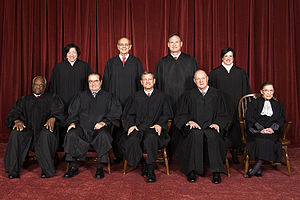
|
| Supreme Court, 2017 |
all the current wrangling about abortion, it continues to be implicit that the U. S. Supreme Court has a problem, which the Court needs to settle. But in fact, the Court didn't create the whole problem. The Court doesn't need to solve all of it.
First of all, privacy. That word doesn't appear in the Constitution, but surely no one is opposed to making privacy a right. Even
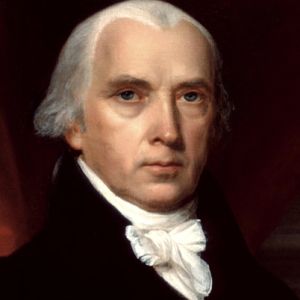
|
| James Madison |
James Madison wasn't opposed to the idea so much as he wanted to avoid cluttering the Bill of Rights with unnecessary detail. Unfortunately, circumstances have now changed enough to make it useful to be explicit about a strictly defined right to privacy. Since no one is truly opposed, what harm would there be in passing a bill in both the House and the Senate, and then having the required number of states ratify it? Once both sides got over the suspicion that somebody was trying to put something over on them, it should be possible to design simple clear language that creates and defines the right to privacy -- and avoids the temptation for somebody to insert some sly wording that does in fact put something over on somebody else. At the very least, creating a written right to privacy by following the prescribed path for amendment should dispel the idea that the abortion issue is part of an elaborate effort to undermine the Constitution.
By itself, this hypothetical amendment would seem like a rebuke to
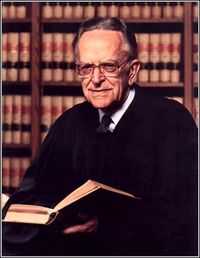
|
| Justice Blackmun |
Justice Blackmun and the rest of the Supreme Court. It needs something else added in order to look like a compromise, which it is. So, what's proposed further is a declared presumption that state laws written before 1890 which forbid the performance of abortion were written with the intent of protecting the health of the mother.
That seems to be historical fact. There was a forty-year window of time between the invention of anesthesia, which made abortion easy to do, and Lister's invention of aseptic technique,
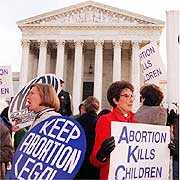
|
| anti-abortion |
which make abortion safe. The anti-abortion crusade, led by the American Medical Association, took place during that window of time. The AMA was alarmed by the medical disasters it was witnessing and urged legal measures to curtail it. When the safety issue was resolved by Pasteur and his followers, the AMA greatly softened its position. It is now surely true that more mothers are protected by abortion than harmed by it. If the courts have a role in untangling this mess, it is to recognize that the original intent of the anti-abortion laws has become lost by ignoring the changed scientific situation.
Well, where would this leave us? It should get privacy out of the issue, by making it clear that the right to privacy in the new amendment is not to be stretched to legitimize
just anything that people want to keep private. Murder, for example, is something everyone might well wish to hide but could hardly be legitimized by a right to privacy. Nor is defecation, which everyone wishes to keep private, to be prohibited just for that reason. Abortion could be constitutionally established as something people have a right to keep private, but abortion -- other than to protect the health of the mother -- is not legitimized or de-legitimized by saying so.
Does teasing out the sophistries then settle the question of abortion? No, but it would reduce the problem to its essence. By the process of teasing away the irrelevance, abortion then becomes a process which is safe, easy to do, and legitimate whenever it protects the health of the mother. Whether to prohibit it when it lacks those features would be a decision for the individual state governments, so long as the threat of public exposure is not used as an enforcement weapon, as every reader of Hawthorne knows it has been.
Perhaps we can even imagine the day when stripped of emotional demons, abortion can be viewed as a rather cumbersome contraceptive method, currently resorted to far more frequently than is sensible.
Employees Can Try to Force Companies To Ease Burden of Rising Medical Costs
Your Money Matters: Michael Waldholz (Staff Reporter of The Wall Street Journal)
If you aren't already paying a larger portion of your health-care bills, you probably will be soon.
In an effort to break their rising health-insurance costs, a growing number of companies are for the first time requiring employees to pay a deductible typically $100 to $200 a year family member before receiving benefits. Some companies that already had deductibles are raising them to as much as $500 a person. And some employers are no longer paying 100% of hospital bills.
You may pay as much as $1,000 to $2,000 a year of your medical bills under the new plans, instead of several hundred dollars. Adding to the pain, recent tax changes have made deducting medical expenses more difficult.
What can you do if your employer wants to change your health insurance? Although looking for a new job may seem to be the only solution, many personnel managers and benefits consultants say you may be able to persuade your company to ease the additional cost burden if you have the right information. It won't be easy, and many employers won't budge. But, in exchange for requiring you to pay more of your doctor bills, employers can upgrade other aspects of the health plan that won't necessarily cost them extra and could save you plenty.
"I'd adamant with my employer," says Joseph H. Rossmann, a consultant with A.S. Hansen Inc., "If he wants me to pay more of my medical bills, he has a responsibility to set up programs to help me be a better buyer of medical services."Benefit managers say recent research shows that employees who pay a greater share of their health bills sharply reduce their use of company health-insurance plans. Although some public-health officials say higher costs may cause patients to postpone needed care, insurers and employers say there isn't any evidence that employees health suffers. Rather, they say, the new plans encourage employees to seek less expensive but equally effective treatment.
Exactly how much this actually reduces health care costs isn't known. But Hewett Associates Inc., a consulting firm, estimate a $100 deductible can save an employer 14%. A $200 deductible can mean a 21% savings, and a $300 deductible can save 25%, the firm says.
Much of this savings result from what H+James Norton, a principal partner with benefits consultants William M. Mercer-Meidinger Inc., calls a "blatant cost shift" from employer to employee. To soften the blow, many employers couple higher deductibles and other changes that cost employees more money with broader coverage and added benefits including fitness programs, or other Sweeteners.
Berol Corp., a Danbury, Conn., company that makes pencils and Pens, used to cover almost all medical bills after employees paid a $100 deductible for outpatient treatment. It now covers 80% of medical bills after employees pay a deductible of $175 per person or a maximum of $350 per family, But as an incentive to limit the use of the plan Berol also pays each employee $500 a year, less any benefit payment. For instance, a worker who has $350 in covered medical bills will pay the first $175; the insurance plan will cover 80% of the rest, or $140. At the end of the year, the employee will get $360-$500 minus the $140 benefit payment.
Moreover, Berol pays for service it didn't previously cover, including routine doctor visits, physicals, and all infant medical care. The company also invites area doctors and nurses to speak at seminars advising employees on how to diagnose common illness and on where to find less expensive, out-of-hospital services. Berol's medical insurance spending, which had been rising 18% a year, has been steady since the new plan began three years ago.
Employers are finding that higher deductibles are more effective in reducing costs when targeted at the most expensive types of care. William Byrd Press Inc, of Richmond, VA., requires employees to pay the first $100 of every hospital admission, an additional $20 for each hospital day outside intensive care 20% of the doctor's hospital bill. "We want our employees to have an incentive to ask their doctor's whether they really need to be hospitalized, and then, if they are admitted, to press their physicians to discharge them as quickly as possible," says Stephen Lane, the company's director of human resource management.
Some companies use other approaches, such as paying the full cost of laboratory tests needed for hospitalization if they are performed before a patient is admitted. Some pay 100% of certain operations, such as tonsillectomy, that is performed in a doctor's office or surgery center that doesn't require an overnight stay. Others waive the deductible for hospitalization if it is approved by the company's insurance carrier or other so-called pre-admission certification agency.
There are also special programs that can save money for your employer and you. Health-maintenance organization, for example, usually provide all care without any deductibles, often charging employers a premium at or below the cost of other coverage. No Law requires employers to offer HMO membership, but you can encourage an HMO in your area to make a presentation to your company. Remember, though, most HMO's keep costs down by using their own doctors; if you join one, you will usually have to give up using your physician.
Another program increasingly available throughout the country is the PPO or preferred-provider organization. This type of program, usually organized by insurance companies, promises employers lower health-costs by signing contracts with doctors and hospitals with records of being cost-conscious. As an incentive to use these less-costly professionals, your deductible will be eliminated or reduced. Unlikely another of your choice belongs to the PPO Your employer can find out if a PPO exists in your area by asking its present insurer or the local chamber of commerce.
Finally, if your employer reduces its coverage of a hospital stay from 100% to 80% of the costs, check whether there is a limit on the amount you can be required to pay in one year. Many companies limit employee payments to $1,000 to $2,000. Without such a limit, even a short hospital visit could cost thousands of dollars.
A Toast to Doctor Franklin
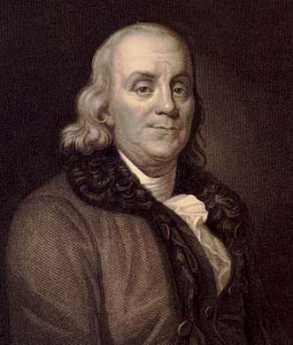
|
| Benjamin Franklin |
Benjamin Franklin's formal education ended with the second grade, but he must now be acknowledged as one of the most erudite men of his age. He liked to be called Doctor Franklin, although he had no medical training. He was given an honorary degree of Master of Arts by Harvard and Yale, and honorary doctorates by St.Andrew and Oxford. It is unfortunate that in our day, an honorary degree has degraded to something colleges give to wealthy alumni, or visiting politicians, or some celebrity who will fill the seats at an otherwise boring commencement ceremony. In Franklin's day, an honorary degree was awarded for significant achievements. It was far more prestigious than an earned degree, which merely signified adequate preparation for potential later achievement.
And then, there is another subtlety of academic jostling. Physicians generally want to be addressed as Doctor, as a way of emphasizing that theirs is the older of the two learned professions. A good many PhDs respond by rejecting the title, as a way of sniffing they have no need to be impostors. In England, moreover, surgeons deliberately renounce the title, for reasons they will have to explain themselves. Franklin turned this credential foolishness on its head. Having gone no further than the second grade, he invented bifocal glasses. He invented the rubber catheter. He founded the first hospital in the country, the Pennsylvania Hospital, and he donated the books for it to create the first medical library in the country. Until the Civil war, that particular library was the largest medical library in America. Franklin wrote extensively about gout, the causes of lead poisoning and the origins of the common cold. By inventing bar soap, it could be claimed he saved more lives from the infectious disease than antibiotics have. It would be hard to find anyone with either an M.D. degree or a Ph.D. degree, then or now, who displayed such impressive scientific medical credentials, without earning -- any credentials at all.
Introductory Remarks: Anti Trust in the Twenty-First Century
Public be damned: testimony on managed care improvement legislation
Your bill, The Managed Care Public Choice and Improvement Act, reflects growing concern about the techniques and effects of HMOs and other forms of so-called managed care. It has been said that managed care stands convicted in the court of public opinion. That's about right, but it may miss the whole point. Let me explain.
Ordinarily, when a commercial product for sale has annoyed and frightened great masses of the public, it is unnecessary, and may even be counterproductive, to pass laws about it. The public will simply stop buying the obnoxious product, and the vendor will then either change his ways or go out of business. The customer is always right, we say, and businesses which do not acknowledge the reality are soon part of history. I'm afraid, however, that health insurance is a different sort of product.
In the first place, it has been given an almost unique income tax advantage. It is tax exempt as a business expense for the employer, it is not taxed as income to the employee, and it is not taxed when you use the insurance. This bizarre feature was created during World War II when we had wage and price controls, and it was never repealed. After the war, the IRS attempted to have the tax shelter repealed, but Congress lacked the political courage to change the law and it persists, now fifty years after the end of the war which was its excuse. This tax feature is the reason that almost everyone tries to have the employer buy it for them since it is about 30% cheaper that way. I buy it for my secretary and it gets the tax dodge, but when I buy it for myself, it does not get the tax credit because I am self-employed, not working for a salary. You might think this obvious unfairness was an accident, but the events of the recent Kennedy-Kassebaum bill prove it was not accidental at all. The K-K bill granted me and other non-salaried people 40% of the salaried exemption and gradually increased it to 80% of the salaried situation in ten years. Even this grudging concession to fairness was qualified by a clause which states even partial exemption is not available to anyone eligible for insurance to be bought through employer plans, I Make the strong surmise that insurance industry lobbyists must have been fluttering around the door of the House-Senate conference committee which enacted it.
So, the customer isn't always right, the customer must take what the employer chooses to give him. Managed care would have been history two years ago except for this tax provision. Now, there exists a second quirk of managed care which helps it persists in spite of public hostility. Public reaction quite naturally supposes that the high-handed and impertinent to save money. I doubt that. There has been enough experience with this matter to demonstrate that the high costs of this intrusive administration eat up most or all of the savings to the employer. The best that can be claimed is the rather weak argument that costs might have been even higher without managed care. Since the larger health insurers are currently before the Pennsylvania Insurance Commissioner requesting a 23% rate increase, it is far from certain just who is cheaper than whom on a five-year basis, regardless of appearances in any singer year.
If managed care doesn't save money, why do it? Weel, the central profit center in health insurance today is "adverse risk selection." If an HMO achieves a mixture of clients who are mostly healthy, its costs will be far less than with a mixture of clients who are sick. Healthy people don't get hassled by managed care; for them, the HMO is just a card in their wallet. The people who are getting hassled are sick, using the system, and generating the costs. Since the insurance company makes a considerable profit if such people get discouraged and choose another insurance, you can see there is actually a financial incentive to be obnoxious. The fact that the public doesn't like it is not a handicap, it is an asset. Therefore, this may be one of those peculiar situations where people like me, who dislike governmental intrusions, began to turn to the government for relief.
On a philosophical level, I am consoled by the fact that it was a government which started this mess, by creating the tax dodge which forces people to surrender their health care choices to their employers. In that sense, the government created this mess, and perhaps only the government can solve it.
This situation is far more serious than it has been portrayed to be. What the Health Care providers are doing to themselves to combat managed care is, in my opinion, more damaging and likely more permanent than what the HMOs are doing to providers. A central feature of this financial war is the aggressive assault by insurers on hospitals, to force them to reduce prices. In responding to this assault, hospitals have attempted to band together to resist demands for discounts. The usual method is for a nonprofit hospital to create a for-profit subsidiary and then sell it. That leaves a nonprofit shell with a lot of money, and no fixed mission to spend it on. In the Philadelphia region alone, I am aware of for-profit conversions foundations which have as much as $280 million in assets, and it seems likely the aggregate is nearly 4 billion dollars in what was once the community's reserve for charity, teaching, and research. That buffer is now out of the hands of the hospital operating units but remains threatened by potential claims of bondholders of municipal bonds sold for the original purpose of building hospital structures. If managed care finally succeeds in causing a train wreck of the community health delivery system, this reserve is going to be unavailable.
Hospitals are not the only entities which are merging in response to the managed care threat. Indemnity health insurance companies, or insurance with minimal managed care, may be defined in the present environment as providing "generous" health insurance. However, these generous health plans are being driven out of the marketplace by a quirk known as "adverse risk selection." Whatever an employer provides a choice of several health insurance options with fixed dollar employer contributions, it is well recognized that this system will quickly destroy the most generous options. Persons who perceive they will have significant health costs next year will tend to select the most generous plan, thus driving up its premium. On the other hand, people who perceive they will have little or no health costs next year will select the cheapest plan regardless of its benefit provisions, since they see it as buying nothing but a card in the wallet. And with a disproportionate number of clients who make no health claims, the premium of the cheapest plan is driven down even further. The adverse risk selections process will thus send the most generous plan into a "death spiral", and the following year the process will be repeated with the next most generous plan until eventually nothing but managed care is left, the more obnoxious the better from the insurer's point of view. The health benefits provided by Harvard University to its employees experienced this death spiral, in which the most generous plan went from being the most popular choices to having zero clients, in three years after Harvard instituted a fixed contribution system, while the other Boston employer plans showed no such tendency. I imagine that many faculty members of Harvard would claim to believe that healthy people should help share the costs of people who are sick. However, their own behavior seems to show that in fact, they are quite unwilling to pay their own actual costs, once the subsidy by well people are removed.
Hospitals are not the only ones merging. The statewide Blue Shield plan (which pays doctors) is involved in a contested merger with Western Pennsylvania Blue Cross (which pays hospitals), within a resulting combined entity called Highmark. Highmark is requesting a 22% rate increase, reflecting a loss of about $300 million last year by the Western Pennsylvania Blue Cross. Since no similar loss by Blue Shield is known, a concern must be expressed that premium payers in Central and Eastern Pennsylvania will be in effect subsidizing losses in Pittsburgh. This disturbing development can be ultimately traced to the destructive effect on Blue plan indemnity insurance by HMO managed care; the Blues are on the edge of an insurance "death spiral," which they are attempting to stop by engaging in managed care themselves. any number of innocent bystanders are liable to be hurt in the process.
The one legislative charge which would probably correct the whole managed care mess is to extend equal tax exemption for health insurance purchased by individuals. That change is only possible for the United States Congress. It was well on its way toward passage in the Kennedy-Kassebaum bill when it suddenly got limited in a variety of ways. I happened to meet one of the authors of the bill at a social function and asked why it happened. The answer was, "I was afraid I might hurt the insurance companies."
I hope you find these remarks useful. I would happily answer any questions.
Legal Standing
The first obstacle for a lawsuit to jump is the right to use the courts. Although failure to demonstrate injury is one of the commonest ways to clear a court's calendar, insisting that the lawsuit must have some utility has become the very foundation for an impartial body of government to be free to settle disputes between citizens. There are other mechanisms, particularly the Courts of Equity of the young Republic, when there were many occasions when something was obviously wrong, but no statute covered the situation. By the Civil War, the Legislative Branch had more than supplied any deficiency of statute. The State of Delaware now has the only surviving Court of Equity, and "standing" now protects the courts from floods of useless lawsuits. However, that leads to the present Court System sometimes blocking a lawsuit, simply because the cause of the complaint is too broad, and requires special strategies to proceed. At the least, it requires a description of how an entire profession has been barred from its customary role, by an accident within the Judicial System.
History of the Matter. In the District Court of Maricopa County, the State of Arizona successfully sued the Maricopa Medical Society as antitrust for its prohibition from Medical Society Membership, any member who charged an indigent patient substantially greater than a fee published by The Society. This action was described as a per se violation of federal antitrust law, and without any trial of the facts was appealed successively to the U.S. Supreme Court. Two Arizona Justices recused themselves, and again without trial of the original summary judgment, was upheld by a 4-3 decision which still stands as National Law.
Subsequent Consequences. In Medical Circles, the Maricopa case is described as "dethronement of the doctors from control of the medical system" and "their replacement by non-physicians". For example, in 1948 the Nation's First Hospital (The Pennsylvania Hospital in Philadelphia) had two administrators, the Administrator and his secretary. Today, the same building which housed 200 patients in 1948 is entirely filled with puzzled administrators. The transition from physician control to something more legal has required insurance redesign which is still an expensive mess. After fifty years of trying, the pharmacy system is still cumbersome, the nursing schools have been upended, and the greatly enlarged billing system is still undecipherable. Meanwhile, physicians are quitting in their fifties because of the welter of unnecessary paperwork which keeps them from doing what they were trained to do, an occasional old nurse still defiantly wears a nursing cap, while cafeteria workers fumble at new-fangled uniforms. Everything has been unnecessarily changed, concealing the fact that it did not need to be changed. Meanwhile, those who took these supervisions in their stride are retiring early. Doctors used to marry their nurses; you now seldom hear of that. Salaries, which used to be zero, are now in six figures. Everybody complains; no one does what he was trained to do, especially the trustees. It once was the function of trustees to oversee funding requests of the doctors and get the money when needed; nowadays they rubberstamp the plans of administrators. There are simply hundreds of computers; no one reads their output. The disappearance of thirty common diseases (tuberculosis, syphilis, polio, rheumatic fever, etc.) is what keeps the system from collapsing. I received a salary of zero for four years, my grandson makes $53,000 a year of what is surely government money for much less medical work, much more red tape. If you don't believe these tales, I will be happy to call these people as witnesses. No doubt, witnesses for the other side will be happy to testify as well, and you can decide for yourself.
Repairing the damage. It took two thousand years to design the old system, but only fifty years to bring many hospitals to mergers, two medical schools to near collapse in Philadelphia alone. The Rs are fighting with the Ds over God knows what. All this mess cannot be repaired quickly, but it wouldn't hurt to get started. The Health Savings Account would be a better place to begin. Since remanding Maricopa for full trial would only be a beginning without much repair, it's little enough to ask as a beginning. The goal, well beyond my own sunset, would be to put the doctors back in charge and then waiting for fifty years. At least, stop getting in their road, since it is only fifty years since they stopped being the most admired profession on earth.
22 Blogs
Yale Blue
 Academia is acquiring unaccustomed power, wealth and arrogance. It can cause friction with students whose career plans lie in other directions.
Academia is acquiring unaccustomed power, wealth and arrogance. It can cause friction with students whose career plans lie in other directions.
The Supreme Court Gets Fed Up With Professors
 The interpretation of American law belongs to Judges, not to law schools, and administration of the courts is controlled by the U.S. Supreme Court. Period. What the two subjects have to do with each other was not explained, but Washington DC has a way of circulating rumors. The opinion was a warning.
The interpretation of American law belongs to Judges, not to law schools, and administration of the courts is controlled by the U.S. Supreme Court. Period. What the two subjects have to do with each other was not explained, but Washington DC has a way of circulating rumors. The opinion was a warning.
William Penn, Justice Holmes, and the Inner Light
 The hippies of the 1960s can be understood as just one extreme swing of an old, old pendulum.
The hippies of the 1960s can be understood as just one extreme swing of an old, old pendulum.
A Brief WILLIAM PENN CHRONOLOGY, 1644-1718
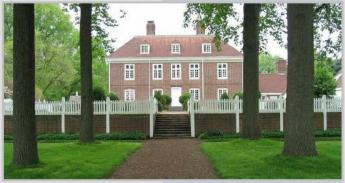 .
.
William Penn, Excellent Lawyer, Terrible Businessman
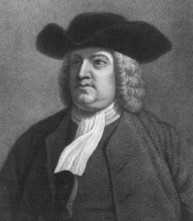 William Penn was the central force in the establishment of a religion, Quakerism, certain central features of the legal system, three colonies of America, and many of the central concepts of Constitutional Law. He leaves us over three thousand documents, but it remains very hard to form a picture of what he was like.
William Penn was the central force in the establishment of a religion, Quakerism, certain central features of the legal system, three colonies of America, and many of the central concepts of Constitutional Law. He leaves us over three thousand documents, but it remains very hard to form a picture of what he was like.
Not Only to Own, but to Govern
 King Charles II apparently recognized that Pennsylvania was ungovernable from London, three thousand miles away, and gave William Penn powers that essentially made him a vassal king.
King Charles II apparently recognized that Pennsylvania was ungovernable from London, three thousand miles away, and gave William Penn powers that essentially made him a vassal king.
Freedom, But Not Independence
 Very likely, King Charles's advisors warned him of the possibility that colonies might drift away and even become enemies in time. Provisions about immigration policy and foreign relations needed some sort of review by the Crown.
Very likely, King Charles's advisors warned him of the possibility that colonies might drift away and even become enemies in time. Provisions about immigration policy and foreign relations needed some sort of review by the Crown.
Pennsylvania Likes Private Property Private
 The King used to own the whole country. William Penn got us used to the idea that my property is mine, not the King's.
The King used to own the whole country. William Penn got us used to the idea that my property is mine, not the King's.
A Pennsylvania Farmer in Delaware
 John Dickinson achieved national fame in 1773 by publishing twelve letters written earlier denouncing the Townshend Acts. They were published anonymously as Letters From a Pennsylvania Farmer. His farm, curiously, was in Delaware.
John Dickinson achieved national fame in 1773 by publishing twelve letters written earlier denouncing the Townshend Acts. They were published anonymously as Letters From a Pennsylvania Farmer. His farm, curiously, was in Delaware.
Advantages and Disadvantages of Being a Small Country
 Remaining a small country has many merits, but one big demerit. Your neighbors are tempted to swallow you up.
Remaining a small country has many merits, but one big demerit. Your neighbors are tempted to swallow you up.
Navigation and Mineral Rights
 Since the Delaware Bay and River were shared by colonies, it was essential that the rights to navigate be defined. Later on, the issues became bridges and tolls, fishing and channel deepening.
Since the Delaware Bay and River were shared by colonies, it was essential that the rights to navigate be defined. Later on, the issues became bridges and tolls, fishing and channel deepening.
The Origin of States Rights, a Rumination
The clamor for States Rights probably began with Virginia's claims for western territories.
Unalienable Rights Before 1776
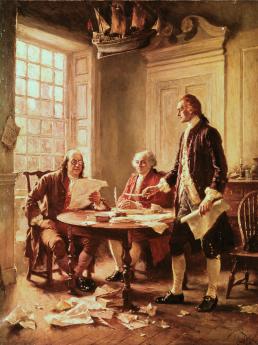 Lawyers commonly say the Declaration of Independence "informs" the Constitution. But prior informing was performed by William Penn, the Roman Empire, and Hammurabi.
Lawyers commonly say the Declaration of Independence "informs" the Constitution. But prior informing was performed by William Penn, the Roman Empire, and Hammurabi.
First Amendment: Separation of Church and State
 Eleven of the original thirteen colonies had,"established" religions. The separation of church and state by the First Amendment was not a statement of fact, but a worrisome departure from the past, mostly prompted by the behavior of the Virginia Episcopalians. For the Pennsylvania Quakers, disestablishment was a most disheartening event.
Eleven of the original thirteen colonies had,"established" religions. The separation of church and state by the First Amendment was not a statement of fact, but a worrisome departure from the past, mostly prompted by the behavior of the Virginia Episcopalians. For the Pennsylvania Quakers, disestablishment was a most disheartening event.
Money as Political Speech
New blog 2018-11-13 19:44:55 description
Volunteerism Needs a Business Plan
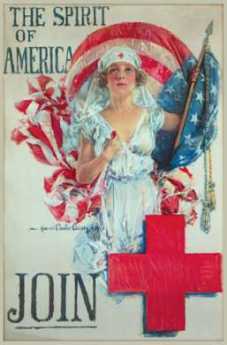 Volunteerism has declined in recent years because of conflicting demands made by gainful employment. The spirit of volunteerism has not diminished, it just needs a different business plan.
Volunteerism has declined in recent years because of conflicting demands made by gainful employment. The spirit of volunteerism has not diminished, it just needs a different business plan.
Let's Give the Supreme Court Some Help
 It's getting to be time to have an up-or-down vote on the constitutional right to privacy.
It's getting to be time to have an up-or-down vote on the constitutional right to privacy.
Employees Can Try to Force Companies To Ease Burden of Rising Medical Costs
New blog 2019-02-25 20:08:17 description
A Toast to Doctor Franklin
 The Franklin Inn annually toasts three doctors. Even though Ben never went past second grade, his medical contributions are the most illustrious of the three. One of the most remarkable men who ever lived.
The Franklin Inn annually toasts three doctors. Even though Ben never went past second grade, his medical contributions are the most illustrious of the three. One of the most remarkable men who ever lived.
Introductory Remarks: Anti Trust in the Twenty-First Century
Public be damned: testimony on managed care improvement legislation
New blog 2019-02-21 17:17:10 description